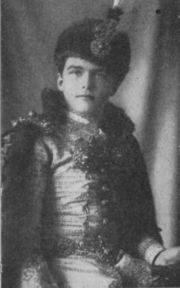Otto II, King of Hungary
From Kaiserreich
Otto von Habsburg-Lothringen (born Franz Joseph Otto Robert Maria Anton Karl Max Heinrich Sixtus Xaver Felix Renatus Ludwig Gaetan Pius Ignatius in Reichenau an der Rax, Austria-Hungary, 20 november 1912) is the third and current Emperor of Austria-Hungary since 1 April 1922 and the death of his father, Karl I of Austria-Hungary.
More precisely, he is known as Emperor Otto I of Austria, King Otto II of Hungary, King Ottokar III of Bohemia. He also bears the titular titles of King of Croatia, Dalmatia and Slavonia, Duke of Carniola, King of Galicia, King of Lodomiera and King of Illyria, which are not officially recognized as nominal constituants of the Dual Monarchy of Austria-Hungary.
Early life
Otto was born near Vienna in Reichenau an der Rax, Lower Austria, son of Archduke Karl of Austria and Princess Zita of Bourbon-Para, in 20 november 1912. His father became heir presumptive for the old emperor Franz Josef (Otto's great-granduncle) then archduke Franz Ferdinand was assassinated in Sarajevo by a Serbian nationalist in June, 28 1914, thus beginning the Weltkrieg. Karl became Emperor Karl I of Austria and King Karl IV of Hungary in 21 November 1916. Otto became at 4 the Crown Prince of one of the oldest and most fragile monarchies of the world.
Due to his poor health, Emperor Karl died in 1922 of pneumonia, without having realized his dreams of modernization of the old Dual Monarchy, impeached by the Weltkrieg, the firm and conservative Austro-Hungarian political class and the economic crisis beginning in the country. Shortly after, at 9, just after the Weltkrieg, Otto became the head of one of the most shaterred states of the world.
Reign
Of course, Otto's reign was under the authority of a Regency Council formed by Empress Dowager Zita, marshal Franz Conrad von Hötzendorf and Austria Minister-President Albert von Mensdorff-Pouilly, which preferred strong likes with powerful Germany, poor negociations for the status of several regions during the 1927 Augsleich, and consolidating Habsburg dynasty's strength in the region (Vasily I von Habsburg as King of Ukraine, Giuseppe von Habsburg-Toskana as pretender to the Italian throne, treatments against defeated Romania, Serbia and Montenegro).
Major since his eighteenth anniversary in 1930 and de facto ruler, Otto is now the only guarantor of the unity of his shaterred empire on the eve of Ausgleich renegociations for 1937, which will certainly be rather violent.
Personal life
Emperor and King Otto is well-known for his admiration of democratic systems, which put him in distance towards his own ministers. He is also one of the youngest monarchs in the actual world, and is still a bachelor; if he would die without a son, the crown of Austria-Hungary would go to his brother, Archduke Robert, only three years younger than him. He has also seven siblings (four brothers and three sisters).

